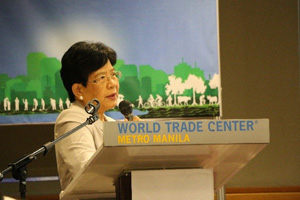 PASAY, Metro Manila – The Philippine Council for Agriculture, Aquatic and Natural Resources Research and Development of the Department of Science and Technology (DOST-PCAARRD) tackled the issue of food safety and security during the recently concluded National Science and Technology Week (NSTW) in a technology forum held at the World Trade Center, Pasay City, Manila.
PASAY, Metro Manila – The Philippine Council for Agriculture, Aquatic and Natural Resources Research and Development of the Department of Science and Technology (DOST-PCAARRD) tackled the issue of food safety and security during the recently concluded National Science and Technology Week (NSTW) in a technology forum held at the World Trade Center, Pasay City, Manila.
Food safety has been a critical issue in the country. Documented cases of double dead pork, bird flu, fruit fly, and other food contamination are pestering farmers and consumers. As the range of products become available in the market, consumers are also exposed to varieties of possible food safety and health issues.
Dr. Isabelita M. Pabuayon of the College of Economics and Management, University of the Philippines, Los Baños (UPLB-CEM), presented the topic, “Are we ready for the food safety regime? Evidence for the commodity stakeholders.”
The topic intends to strengthen the food safety initiatives among PCAARRD’s commodity stakeholders.
The forum provided a deeper understanding on the effects of unsafe food due to lack of system and protocols in food processing and poor product handling.
PCAARRD’s commodity stakeholders were assessed on their ability to ensure safe and quality goods according to three determinants: Readiness to accept and take out actions in compliance with food safety standards; Awareness: knowledge or perception of current food safety concepts, policies, and good practices or standards; and Capacity to meet requirements in terms of individual (personal characteristic such as education/training) procedure and resources (facilities and equipment).
Republic Act No. 10611, also known as Food Safety Act of 2013, was crafted to counter cases of poor quality food products from crops, fisheries, livestock, and poultry commodities that are being distributed in the market. Challenges rooting from the farms to the market have been troubling the consumers as well as smearing the food safety integrity of the country.
Dr. Pabuayon concluded that there was higher food safety readiness among the products being exported, products involved in processing, and among organizations with accredited establishments. However, there was a lower readiness among traders who engage in buy-and-sell. She also mentioned that farm size, scale of operation, and business experience are factors in assessing the readiness of the stakeholders.
Among others, this research recommend support to stakeholder’s membership in cooperative and business registration; capacity building activities for producers, traders, and processors; strengthening inspection and monitoring; developing an incentive system for those who comply with the standards; development and adoption of embraceable system; and conduct of consumer education.
Although ensuring food safety is a challenging process, its long-term effects will benefit both consumers and food industry sectors. PCAARRD, through the Technology Forum, supports its various commodity stakeholders to make food safety possible.
